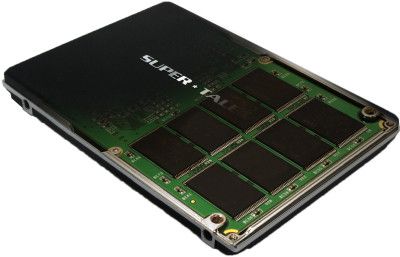From our front-page news:
Less than two months ago, memory manufacturer Super Talent released one of the largest solid-state disks we've seen to date, and at 256GB, it was undoubtedly impressive. But at $6,000, it became more exclusive than a Rolex. The fact is, SSDs started out expensive and haven't gone down in price much at all, but Super Talent's latest release is looking to change that.
Though not stated, their new MasterDrive series are more appropriate for end-users over their original models, as most of them are going to retail for well under $1,000. The 'MX' series will include three different models, 30GB, 60GB and 120GB, the latter of which is rather staggering considering many popular SSDs on the market don't currently go beyond 64GB. Prices are $299, $449 and $699, respectively.
The reason for the lower prices is due to the use of MLC flash chips, rather than the faster SLC. So while the read speed will be on par with what we've seen (120MB/s), the write speed drops to around 40MB/s. The 'DX' series by comparison stick with SLC while boosting the write speed to 70MB/s. Is the speed boost worth the extra cost? At $699 for the 30GB and $1299 for the 60GB, that's a question you will have to answer yourself.
<table align="center"><tbody><tr><td>

</td></tr></tbody></table>
MasterDrive SSDs use NAND Flash rather than magnetic platters as the storage medium, giving them many advantages over HDDs. These drives have no moving parts, and therefore are completely silent, lighter weight and more reliable than HDDs. Moreover, they consume a fraction of the power of HDDs, meaning they produce less heat and offer longer battery life in mobile computing.
Source: Super Talent Press Release
Though not stated, their new MasterDrive series are more appropriate for end-users over their original models, as most of them are going to retail for well under $1,000. The 'MX' series will include three different models, 30GB, 60GB and 120GB, the latter of which is rather staggering considering many popular SSDs on the market don't currently go beyond 64GB. Prices are $299, $449 and $699, respectively.
The reason for the lower prices is due to the use of MLC flash chips, rather than the faster SLC. So while the read speed will be on par with what we've seen (120MB/s), the write speed drops to around 40MB/s. The 'DX' series by comparison stick with SLC while boosting the write speed to 70MB/s. Is the speed boost worth the extra cost? At $699 for the 30GB and $1299 for the 60GB, that's a question you will have to answer yourself.
<table align="center"><tbody><tr><td>

</td></tr></tbody></table>
MasterDrive SSDs use NAND Flash rather than magnetic platters as the storage medium, giving them many advantages over HDDs. These drives have no moving parts, and therefore are completely silent, lighter weight and more reliable than HDDs. Moreover, they consume a fraction of the power of HDDs, meaning they produce less heat and offer longer battery life in mobile computing.
Source: Super Talent Press Release
